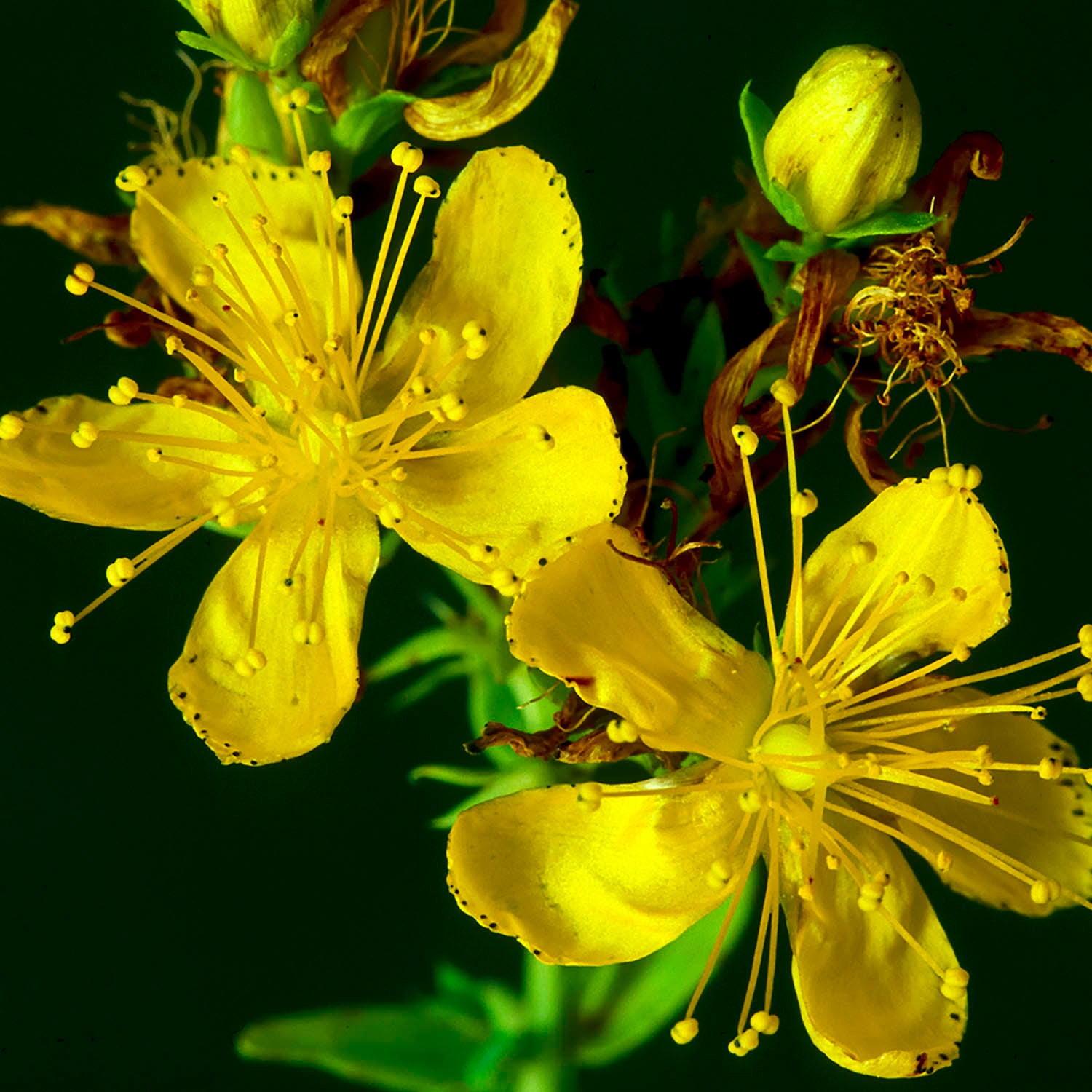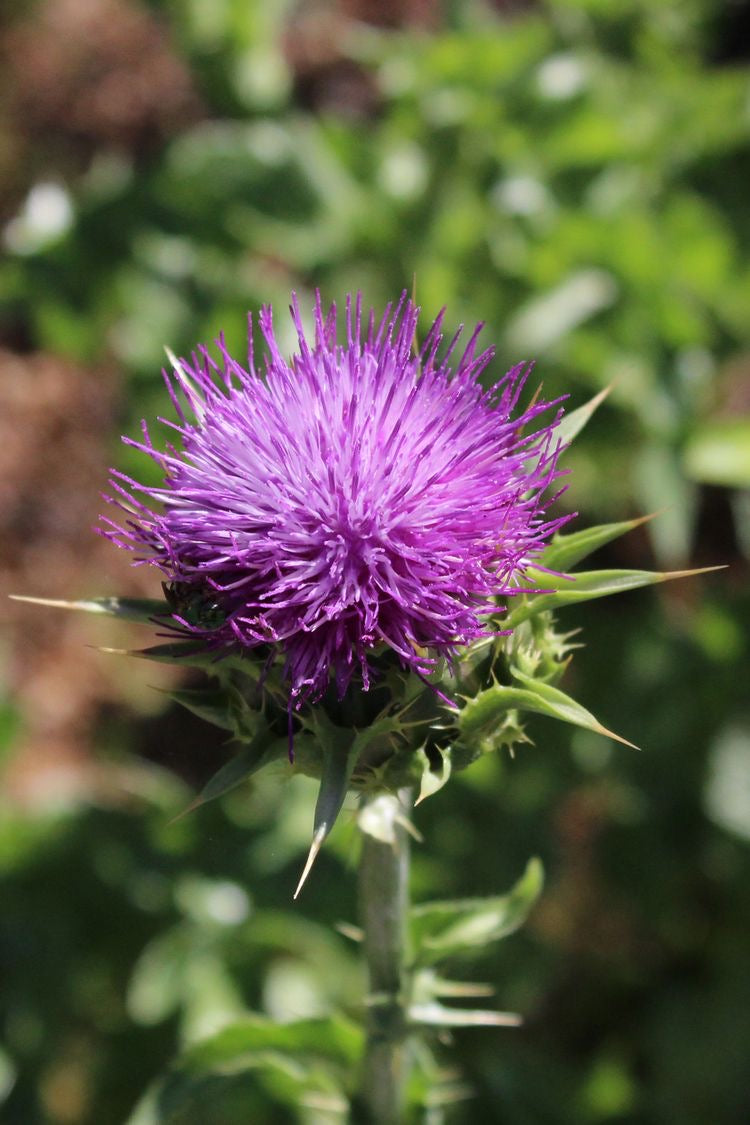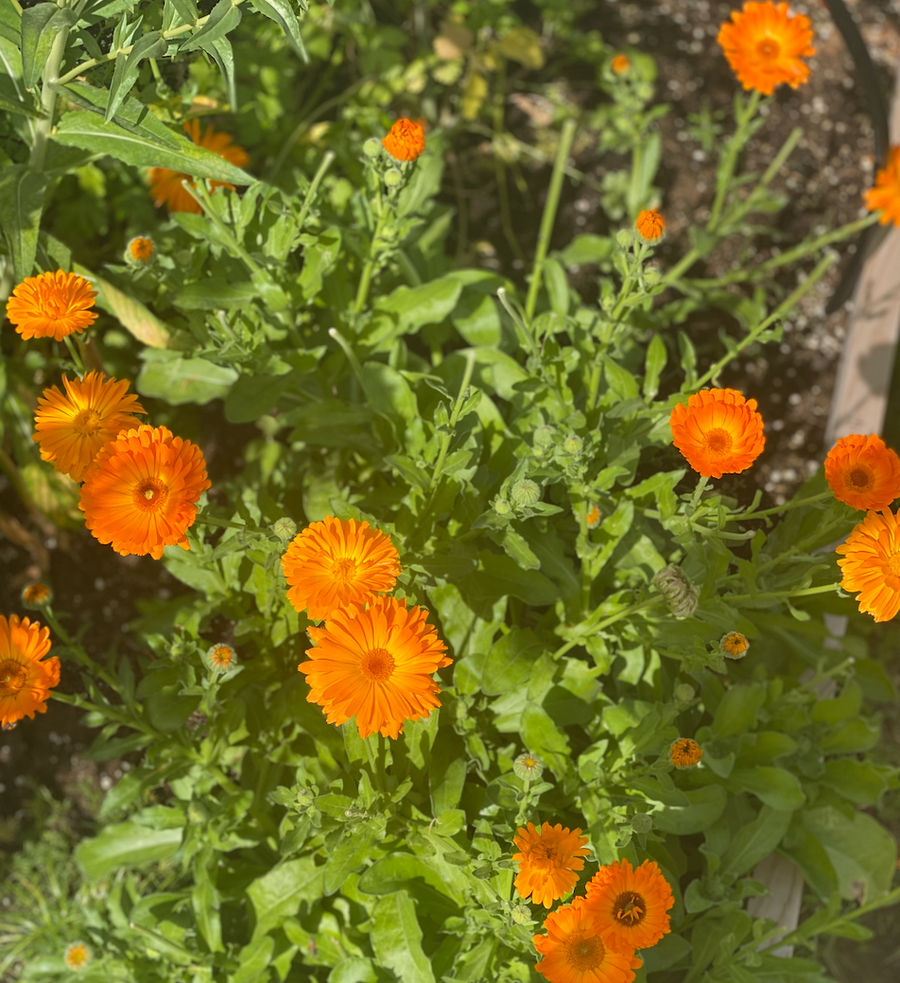No matter how big or small we've all experienced some form of loss in our lives. Grief is the natural response to any loss: loss of a loved one, loss of finance/dream/opportunity, divorce, loss of a relationship, miscarriage. Grief can present itself as one of most intense paralyzing emotions. Our plant allies can help so much through the grieving process in supporting and building the heart whole once again. Plants can help us to find strength, courage and relief as we move through these emotions. We created herbal blends that incorporates some of the most tender and gently moving energetic herbs to support you in times of loss.
St John’s Wort
Hypericum Perforatum
St- John’s Wort is a plant that embodies sunlight. The five-petaled bright yellow flowers begin blooming near the summer solstice, the day with the longest period of light of year. It is one of the supreme nervines of our apothecary, with great power over the nervous system. St John’s Wort is actually particularly known for its ability to even restore nerve function. St John’s Wort has gained notoriety for treatment of depression, which makes sense in the framework of the plant’s relationship with light. Depression obviously has numerous different causes, so it's important to differentiate the cause for each individual. St John’s wort is particularly appropriate in periods where you are still functioning but feel like there is no joy found in daily activities. St John’s Wort is a wonderful remedy for seasonal affective disorder, which is a response to diminished light.
In times of grief, we can sometimes feel like darkness is overtaking our heart. St John’s Wort floods the emotional heart with a sense of lightness, paving way for the light to shine in.
Oat Straw
Avena Sativa
Oat is such a versatile plant. Whole oats is synonymous with a wholesome breakfast: Avena sativa truly holds cosiness and nourishment within its little husks. Oat straw, which comes from the stems and leaves of the Avena sativa plant, is another of my favorite nervines. It is highly restorative to the nerves and dense in nutrient: is it rich in B-complex vitamins and magnesium, which are required for the nervous system’s healthy functioning. It actually nourishes and protects the myelin sheathes surrounding the nerves – the insulating layer that forms around nerves - , ensuring the nervous system’s smooth functioning. Oat-straw is especially helpful for those who feel isolated in times of grief. When you feel like you need support but don’t necessarily have people or systems around you to provide it, oat straw is a great ally.
Schisandra berries
Schisandra chinensis
Schisandra berries are ancestral medicine. They have a history of use in China which dates back thousands of years. Schisandra restores balance to our body’s energy force, and is lifegiving, restorative and renewing. Through its balancing properties, it is said that Schisandra can "calm the heart and quiet the spirit". It’s also well-known for supporting liver function, and is a powerful adaptogen: it strengthens the adrenal function and normalizes the nervous system and immune activity. This translates into its ability to help us deal with stress created by loss by regulating a cascade of hormones and supporting the adrenals when they are 'under fire'. It mediates our fight and flight response. Schisandra is also used as a kidney tonic. According to Chinese medicine, kidneys are where we store our fears and the lungs are where we store grief. Schisandra berry is also shown to strengthen the lungs and support a person who is grieving by preventing the loss of energy through the lungs.
Hawthorn
Crataegus monogyna
Hawthorn is a classic herbal remedy for the heart, not only to tonify and balance the whole cardiovascular system physically, but to also soothe the emotional heart. The flowering tops have a mild sedative action, which act to calm the nervous system and soothe the nerves- something often needed when we’re going through grief. The energetic properties of Hawthorn, helps us to give and receive love, which can be hard to do when our heart hurts so much. It helps to keep the heart open when it might otherwise want to close. It can also help to encourage self-love and self-acceptance. Depending on the type of loss or grief, we can be hard on ourselves, blame ourselves for what happened (or is happening), and lose sight of who we truly are. Hawthorn helps us to develop courage through heart-ache, so we can show up with strength through the dark times. In fact, the word courage comes from the latin word cor, which means heart. I love this because it shows us that being courageous isn’t an act of willpower or forcefulness, it’s a quality that emanates from the heart.
Tulsi
Ocimum sanctum
Tulsi opens the heart and mind and encourages devotion and gratitude. Tulsi is fantastic for soothing the nervous system. Tulsi is an adaptogen, which means it helps your body cope more effectively with any kind of stress, whether it be physical, mental or emotional. In Ayurvedic medicine, tulsi is known as “The Incomparable One,” “Mother Medicine of Nature” and “The Queen of Herbs,” and is revered as an “elixir of life” for both its medicinal and spiritual properties. It’s an herb that is viewed to be deeply sacred (hence the latin name “sanctum”), and has been used for thousands of years to bring mental clarity, uplift the spirits and calm anxiety. Needless to say, this is a powerful plant ally along the emotional journey of grief. Holy basil is connected with the throat and the emotional heart, reinstating support in the voice so that we can express what needs to be released away from the heart in order to move on. This can be useful in times of feeling choked up or having a hard time expressing what’s been experienced through a traumatizing experience. Holy Basil may ensure that both these areas of the body are working together in unison so that it’s easier to release these plaguing thoughts that weigh the spirit down. Plants like Holy Basil are also very aromatic, being useful to clear unwanted energy, while helping to calm and restore the nervous system.
Skullcap
Scutellaria lateriflora
This plant does wonders for the nervous system and brain as a relaxing nervine. Skullcap is a good friend in times of anxiety when the brain will not stop with whirling thoughts around and around. Taking Skullcap during times of grief can help to quiet the thoughts so we can focus on the present and not re-live a painful experience repetitively in our minds. This can be incredibly useful when such thoughts or recirculating traumatic memories prevent us from sleeping.
Skullcap induces restful and deep sleep.





